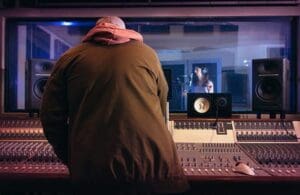Recording sessions can either be amazing and fun or disastrous. As an engineer and/or producer there are steps you can take to ensure your sessions run smoothly and most of all, you keep clients coming back.
1. Arrive Early


(though it does happen), it is time for preparation. Everything from ensuring the session is ready, with more tracks than you need for recording, the microphone(s) is setup up and signal is coming through, the cue mix(es) is setup and has a decent starting point.
2. Make The Client Comfortable


One of the reasons clients chose one studio over the other is comfort and vibe. An easy way to make a client comfortable is by providing amenities such as snacks a drinks. To take it a step further, asking in advance what their preferred items are is an unexpected gesture that will surely be remembered. I myself am an avid coffee drinker and my clients know to expect the sweet aroma of freshly ground coffee beans. I also have an assortment of teas and of course Throat Coat and honey because we often deal with singers right. Beyond hot drinks, water is a must. I like bottled water especially in a post COVID world. A few juices and/or soft drinks to give options.


Snacks can vary a lot. Assorted chips are pretty easy to keep around and things such as crackers, mixed nuts, and my personal favorite fresh fruit for larger sessions are a nice touch. One studio I used to frequent brings out chocolates and caramel!
Beyond food and beverages, some clients like candles and special scents. I have even heard of artist requesting warm towels. Whatever you can do to make them more comfortable the better.
All of these things can be done no matter if it is your own studio or a studio you are renting out. Just like you take care to bring the tools (laptop, MPC, midi controller, etc.) that make you comfortable; taking the time to bring things that make the artist comfortable will bode well for you.
3. Read The Room


If you read the situation right and make the right moves, you can ease the session back in the right direction; putting everyone in a better mood and getting the session running smoothly and hopefully getting an amazing sounding record(s) out of it.
By focusing on just these 3 steps you can greatly reduce the amount of wasted time and un productive sessions you’re apart of.


Starting on drums and migrating to piano and saxophone then continuing on to engineering, DeLaVanta has been in the music industry his entire life. He has produced, recorded, edited, and mixed music in many genres specializing in music with live instrumentation. In addition to music, he has worked extensively in the world of Post Production as a Re-recording Mixer for Films, TV Shows, and Documentaries. Most recently working at Tyler Perry Studios as a re-recording mixer on the hit shows The Oval and Sistas. You can see Del’s full body of work and or contact him on his website: https://www.hydrateent.com/







